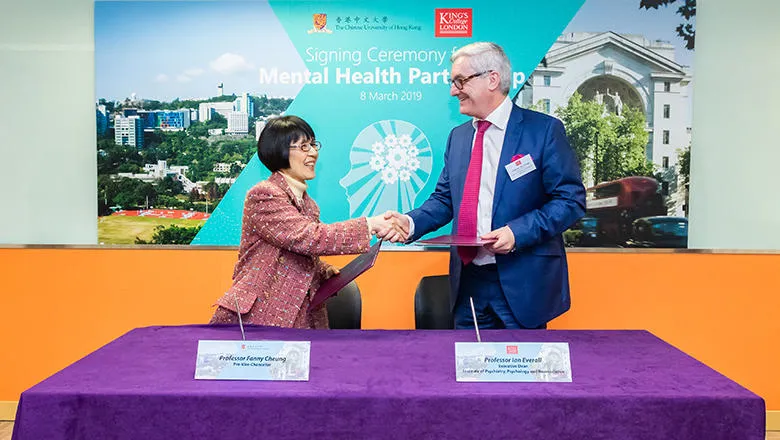11 March 2019
King's partners with Chinese University of Hong Kong to advance Mental Healthcare in HK
King’s College London and The Chinese University of Hong Kong (CUHK) have renewed their longstanding partnership and will collaborate on work that advances the fields of Law, Medicine and Biomedicine, and for the first time, mental health.

A series of joint programmes, co-operative research and other forms of academic interaction will allow the universities to work together to address many global challenges. This will also involve the establishment of a laboratory that adopts novel technologies into mental health research and services.
Professor Fanny M. C. Cheung, Pro-Vice-Chancellor and Vice-President of CUHK addressed at the ceremony, she said: 'The World Health Organization stated that there can be no health without mental health. As a world-class research university, CUHK has been devoted to the study of mental disorders, interventions and prevention to promote mental health for all. We are delighted to establish a new partnership with King’s College London to promote mental health with novel technologies. With the great support from the HKSAR government in the science and research front, we believe our collaboration shall bring significant societal impact and benefit patients in the region and beyond.'
Professor Funmi Olonisakin, Vice Principal (International), said: 'We are excited by the opportunities that this collaboration will bring in the coming years. By sharing knowledge and expertise between our two institutions, we can look to further work in areas that affect a great number in society across the world.'
Mr. Tayyeb Shah, KCL's Deputy Vice President Global Business Development, added: 'With over a billion people globally suffering a mental health problem and public mental health services overstretched in Hong Kong and worldwide, it is timely and appropriate that the renewed MOU between King's College London and CUHK has been expanded to include digital mental health. Using online, mobile and virtual advanced technologies to address mental health are wholly in keeping with Hong Kong's ambition to be one of the world's leading innovation centres.'

Why mental health?
One of the key areas of planned collaboration is advancing study on mental health. Mental disorder is highly prevalent in Hong Kong – 1 in 6 people in the city are suffering from a diagnosable mental illness. However, the city only has 4.5 psychiatrists per 100,000 people, about one-third of the number in the United Kingdom (UK). There is, therefore, a pressing need to explore new technologies that support mental healthcare in HK.
Professor Yun Kwok Wing, Chairman of Department of Psychiatry, Faculty of Medicine, CUHK remarked: 'Our current medical system is inadequate to meet the growing demand for diagnosis and treatment of mental problems. But good news is the advancement in technology provides potential revolutionary solutions. The increasing availability of electronic platform for psychotherapeutic intervention, generation of digital data, extraordinary advances in computational power and software tools, artificial intelligence and etc., enhance the accessibility to healthcare, especially for mental health.'
Professor Ian Everall, Executive Dean, Institute of Psychiatry, Psychology & Neuroscience, King’s College London remarked: 'We are delighted to be partnering with CUHK as a leading research centre for mental health in Asia.'
The hope is that expertise from both universities will allow the power of the digital revolution to be harnessed in order to transform mental healthcare in the region over the next five years.
To ensure the programmes are translational and to maximize patient benefit, the team will collaborate with experts across different disciplines and sectors including healthcare providers and the technology industries. The team has submitted a proposal to the HKSAR Government under the Health@InnoHK research cluster initiative.
